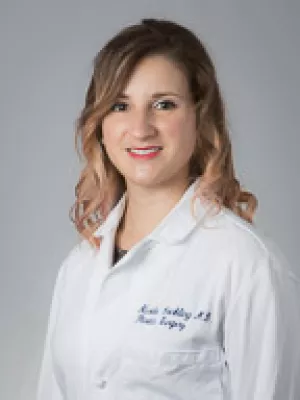Biography
Nicole is an Integrated Plastic and Reconstructive Surgery resident at UCSF. She received her BS in Biology and BA in Studio Art from Washington and Lee University, and her medical degree from SUNY Stony Brook. She is spending two years in the Transplantation Immunology Lab ("Tang Lab") researching chimeric antigen receptor T-regulatory cell therapy for rejection in a mouse model of composite tissue transplantation. Her fellowship is funded by a Ruth L. Kirschstein National Research Service Award F32 grant through the National Institute of Allergy and Immunologic Diseases. Her primary surgical interests are Hand and Microsurgery.
Education
Washington and Lee University, Lexington, Virginia, B.S. Biology & B.A. Studio Art, 2008
State University of New York at Stony Brook, Stony Brook, New York, M.D., 2013
University of California San Francisco, San Francisco, California, Plastic Surgery Residency, 2013-present
Clinical Interests
Hand and microsurgery
composite tissue allotransplantation
In the News
Research Narrative
Vascularized composite tissue allotransplantation (VCTA) still faces many challenges regarding the unique immunologic demands of composite grafts and their propensity toward rejection. Acute rejection is extremely common in clinical VCTA, and chronic rejection remains poorly described. Interest has emerged in cellular therapies as an alternative to immunosuppressive drugs to treat rejection. T-regulatory cells (T-regs), which induce a more tolerogenic state, are known to be instrumental in long-term graft survival, attenuating the long-term sequelae of chronic rejection. Engineered chimeric antigen receptor (CAR) T-regs activated by donor antigens may allow for efficient, targeted therapy for VCTA rejection.
This study employs a murine hindlimb transplant model with two specific aims. First, transplanted mice will be observed clinically and serially biopsied to study the kinetics and cellular aspects of VCTA rejection, examining the architecture of the tissues and populations of graft cellular infiltrates. Second, recipients with rejection will be treated with CAR T-regs as salvage therapy. We hypothesize that CAR T-reg infusion will halt or reverse the rejection process.This project seeks to elucidate what is known about rejection in VCTA, as well as apply a targeted cellular intervention for salvage of rejected grafts. CAR T-cells have shown clinical promise in other fields, and they could feasibly be translated to the treatment of rejection in human VCTA. CAR T-regs represent a powerful tool for treating composite allografts threatened by rejection, as well as progress toward achieving the goal of tolerance without the life-long use of immunosuppressive drugs.
Research Interests
Composite tissue allotransplantation
Immune tolerance
Hand Surgery

